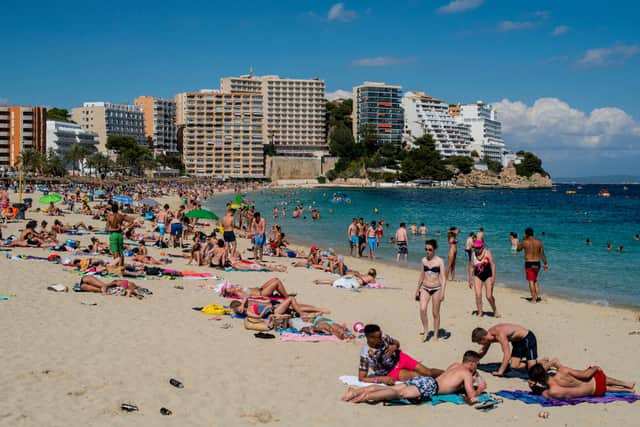Spain Covid entry rules tighten for UK tourists ahead of February half-term holidays
This article contains affiliate links. We may earn a small commission on items purchased through this article, but that does not affect our editorial judgement.
and live on Freeview channel 276
Spain has tightened its Covid entry requirements from this month, introducing stricter rules on vaccination.
The change takes effect ahead of the February half-term holidays, which could impact UK tourists planning to go abroad over the school break.


What are the entry requirements for Spain?
Advertisement
Hide AdAdvertisement
Hide AdThis means that anyone who received their second dose more than nine months ago must have had a booster jab to be allowed entry.
Spain’s official travel website Safe Spain states: “From February 1, 2022, in order to travel to Spain with a vaccination certificate, the certificate must have been issued by the competent authorities of the country of origin at least 14 days after the date of administration of the last dose of the full course of vaccination, as long as the final dose of that course of vaccination was no more than 270 days ago.”
This means that anyone who had completed their primary vaccination (both doses of a two dose vaccine, or one dose of a single dose vaccine) more than 270 days before travelling to Spain must be able to show proof of having received a booster jab.
However, there is no requirement for 14 days to have passed between receiving your booster jab and entering Spain. Booster jabs can be administered at any time prior to travel to Spain.
Advertisement
Hide AdAdvertisement
Hide AdAll visitors to Spain must also fill out a Health Control Form before arrival, which can be completed online or on paper before boarding.
On arrival into Spanish ports and airports travellers must show the QR code (hardcopy or digital) that was issued once the health form has been filled out.
Proof of vaccination is currently the only acceptable form of entry into Spain. The country will not accept proof of recovery from Covid-19 or a negative test to enter.
Travellers may also be subjected to additional checks at the point of entry, including a temperature check, visual health assessment, or testing on arrival.
Advertisement
Hide AdAdvertisement
Hide AdPassengers may also be contacted to undertake a PCR, TMA or LAMP test at any point up to 48 hours after their arrival in Spain.
What are the Covid rules in Spain?
Covid rules are still in place across Spain, with some areas facing stricter measures than others.
The Canary Islands of Tenerife, La Palma and Gran Canaria are currently on the highest Level 4 Covid alert due to rising cases.
Under Level 4 rules, pubs and restaurants are subject to a curfew and must close their doors at midnight, public transport is capped at 75% capacity, and a maximum of six people are allowed to meet, either indoors or outdoors, except for those who are part of the same household.
Advertisement
Hide AdAdvertisement
Hide AdVaccine passports are needed to gain entry to some indoor venues, including bars, restaurants and gyms, and nightclubs are capped at 25% capacity.
Beaches have a 50% capacity and a “prior appointment” may be needed to visit some areas to avoid overcrowding, according to the tourist boards for the Spanish islands.
Rules also mean that spas, jacuzzis and saunas must close, and outdoor pools can only operate at 33% capacity.
The Canary islands of Lanzarote and Fuerteventura still remain on Level 3, meaning venues are subject to closing hours of 1am and limited capacity for indoor seating.
Advertisement
Hide AdAdvertisement
Hide AdThe smaller islands of El Hierro and La Gomera are currently at Level 2.
A message from the editor:
Thank you for reading. NationalWorld is a new national news brand, produced by a team of journalists, editors, video producers and designers who live and work across the UK. Find out more about who’s who in the team, and our editorial values. We want to start a community among our readers, so please follow us on Facebook, Twitter and Instagram, and keep the conversation going. You can also sign up to our newsletters and get a curated selection of our best reads to your inbox every day.
Comment Guidelines
National World encourages reader discussion on our stories. User feedback, insights and back-and-forth exchanges add a rich layer of context to reporting. Please review our Community Guidelines before commenting.
